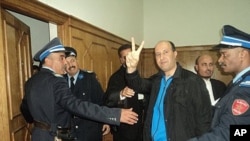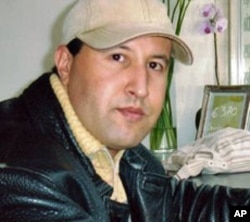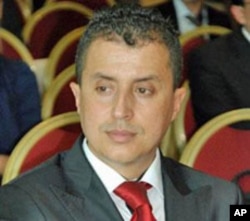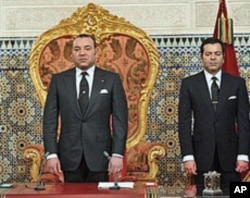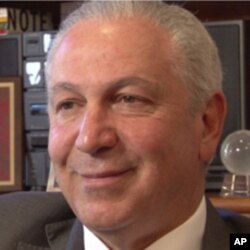A leading Moroccan rights lawyer was recently in Washington to bring U.S. attention to the case of a controversial newspaper publisher now serving a one year jail sentence apparently for exposing alleged government corruption and repression. The case coincides with an upcoming constitutional referendum, part of reforms promised by King Mohammed VI in response to spring protests. Activists are outraged by the case. They say that if the monarchy is serious about reform, it must allow journalists the right to speak freely.
Rachid Nini, 41, is famous for crossing the line. The founder and publisher of the leading independent newspaper, Al-Massae (The Evening), he has generated a huge readership - and tremendous controversy - through his scathing exposé of alleged government and security abuses.
Watch VOA Middle East Newsmaker: The Case of Rachid Nini:
Not the first time
Nini’s arrest on April 28 was not his first brush with trouble. In 2008, he was attacked by three men at knifepoint at a train station in the capital Rabat. A few months later, a Moroccan court fined Al-Massae a whopping $600,000 - the highest against any paper in Moroccan history - after he published details of a gay wedding in the city of Laksar Lakbir. Among the guests, he wrote, was a certain government prosecutor.
The New York-based Committee to Protect Journalists (CPJ) was swift to condemn the decision at the time and called on Morocco’s Supreme Court to overturn the ruling on appeal. “The scale of these damages and the fine imposed on Al-Massae appear to have only one purpose - to bring down the newspaper,” said Robert Mahoney, Deputy Director of the CPJ. “This is part of an ongoing campaign to cripple Morocco's independent press through defamation suits,” he added.
Pushing the limits
This past April, Nini finally seems to have gone too far. In his column “Chouf Tshouf” (literally, “Look and See”), Nini criticized Abdellatif Hammouchi, Director of Moroccan Intelligence and a member of the Crown’s inner circle, and called for the annulment of Moroccan anti-terrorism laws. Nini also revealed details of a corruption case, reportedly involving the head of the Authenticity and Modernity Party, who is also close to the Palace. Lastly, Nini revealed the existence and location of a secret prison near Rabat, as well as the abuse and torture of political prisoners held there.
Secret police arrested Nini on April 28. He was tried and convicted not under the country’s press laws, which prohibit the imprisonment of journalists, but under criminal codes. The charges included disinformation, attacking state institutions, and “compromising the security and safety of the homeland and citizens.”
No big surprise
To many, his arrest was not particularly surprising. In fact, many would agree Nini was as much of a muckraker as a populist crusader. Khalid Jebbar is President of the Washington, D.C.-based advocacy group Moroccan American Youth for Democracy. He says that while Moroccans in the diaspora believe Nini’s sentencing was unfair, “mistakes were made.”
“He’s a great journalist,” Jebbar said. “I’ll always give him that credit. But you have to watch your step. He doesn’t fear nobody [sic]. He attacks everybody. He hits where it hurts.”
Reda Oulamine, President of the rights group Droit et Justice and coordinator for Nini’s international defense team, spoke at a press conference at the National Press Club Tuesday. He said Moroccan courts ignored the law when they prosecuted Nini on criminal charges and subsequently denied him bail.
“There is a specific press code that should have been followed by the court,” Oulamine said, “but since [this] is what we call a political case, the judges have instructions to file certain charges and lead the trial a certain way.”
Journalists beware
Oulamine believes Nini’s sentence sends a tough warning to media.
“The government of Morocco has been using three or four ways of muzzling the press. It can be a tax audit. It can be heavy damages in defamation suits. And it can be jailing in extreme cases. Jailing journalists is a part of the old system of this king’s father [the late King Hassan II]. So we are very surprised that we’re going back now of trying to oppress the press.”
King Mohammed VI ascended the throne in 1999, after the death of his father, King Hassan II. In 2003, he announced a series of reforms. However, say activists, following a series of suicide bombings in Casablanca in May, 2003, the Crown appeared to backtrack and tightened up control, particularly on the press. When protests erupted in Morocco this spring, King Mohammed again promised reforms. In a June 18 speech, he unveiled a new constitution, scheduled for a national referendum July 1.
A good beginning?
Observers say while this is a good beginning, the reforms stop short of creating the parliamentary monarchy activists have demanded. The constitution would transfer some of the King’s power to an elected parliament, however the King would still command the military, appoint diplomats and governors and retain the right to dissolve parliament - with the approval of the Supreme Court, half of whose judges he would appoint.
The draft constitution also guarantees freedom of opinion and its expression “in all its forms" - except where prohibited by law.
Aziz Mekaour, Morocco's Ambassador to the U.S., would not comment on the Nini sentencing, which he termed "a judicial decision."
"But what I can say," Mekaour told VOA, "is that the new constitution not only provides for the freedom of the press, without allowing any censorship before or after. And--this is very important: In the new constitution is a totally independent judiciary, and it says very clearly that the judiciary will be totally independent, and no pressure on the judges will be allowed or permitted."
The U.S. says it is optimistic about reform in Morocco. "As you know," State Department Spokesman Victoria Nuland said at a press briefing Monday, "we believe that all people have the right to free assembly and to express themselves, but we’re encouraged by the proposals put forth by the king to transform Morocco's democratic development through constitutional, judicial and political reforms, and we’re watching closely.”




